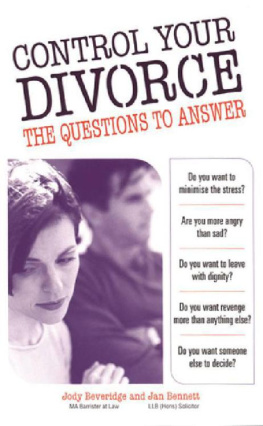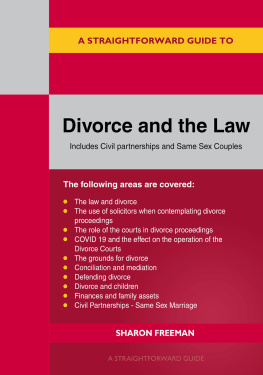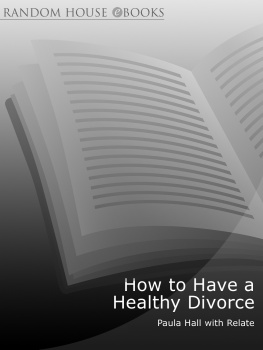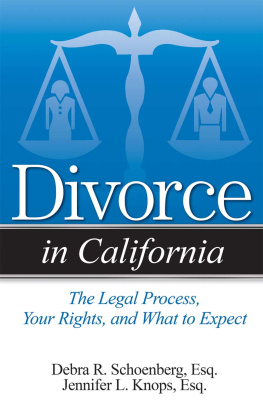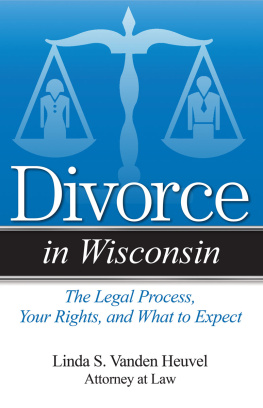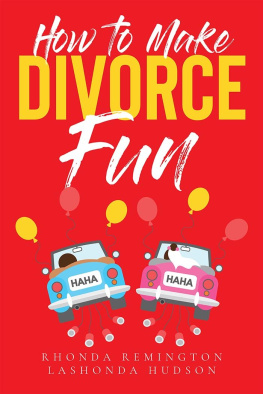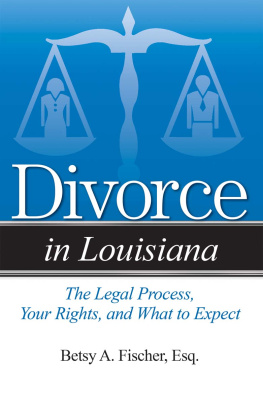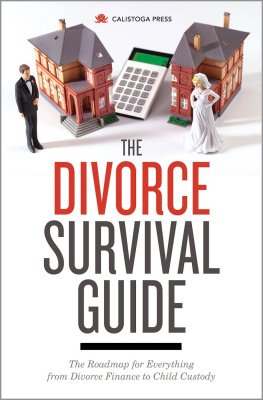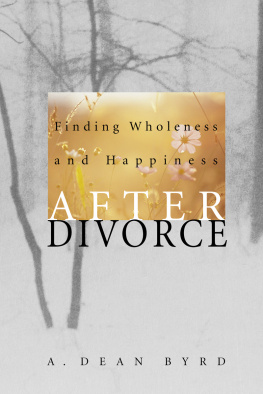
Table of Contents
Acknowledgements
The authors would like to thank the following people:
Carol Jessop, Debbie Fenby, Helen Boynton, Jenny Smith, Nicola Barnard, Frances de Graff, Nikki Ball and Jan Leopard, Eeva and Francis Beveridge, Martin Dunn and Simon Sykes; and Shirley from the Women's Aid National Domestic Violence Helpline.
We would also like to thank the editorial team at Foulsham for their never-ending patience and encouragement! Special thanks to Wendy Hobson and Amanda Howard for all their support and hard work.
And finally thank you to all those people who talked to us about their personal experiences of divorce for the purposes of this book.
Introduction
If you have picked up this book because divorce is on your mind, then it's likely that either you yourself, or someone close to you, is going through a very difficult and confusing time.
You probably have a thousand questions that need answering. You may not have much idea how the divorce process works, how decisions are made about money matters or where the children should live. You may never have been to see a solicitor, or even know whether a divorce is definitely what you want. If that is the case, then this book is designed to answer some of those questions.
In writing it, we have assumed that you don't know much about what getting divorced means, and we have tried to answer in as simple language as possible many of the questions we are asked on a daily basis. Our aim has been to keep the book free of legal jargon, and where that can't be avoided we have tried to explain the meaning in plain English.
This book is not designed for academics or lawyers; it is not a legal textbook, but it is for anyone who feels that, for whatever reason, he or she would like to know a bit more about the divorce process in England and Wales. (While England and Wales share the same laws and legal procedure, the law relating to divorce in both Scotland and Northern Ireland differs in some respects. Our advice, if you are thinking about a divorce in Scotland or Northern Ireland, is to find a book relating to the procedure in those countries.) We may not have covered all the points that are specific to you, because everyone's case is so different, but we hope that from reading this book you will gain a much better understanding of how decisions are made, and what would be likely to happen in your particular case.
What we cannot do is give advice on whether or not divorce is right for you. This book does not try to persuade you either way on that issue, as only you will be able to make that very difficult decision. We do hope, however, that that decision may be a little easier once you have found the answers to some of your questions.
The two authors of this book work in the field of divorce on a daily basis. Jan Bennett is a solicitor and Head of the Family Department at Askew Bunting Solicitors in Middlesbrough. Jody Beveridge is a barrister at York Chambers, working exclusively in family law throughout the north-east of England. Both of us have felt for some time that there are very few books available that tackle the issue of divorce in an informative but easy-to-understand format. Our intention is that this book will go some way towards bridging that gap.
In addition to the work we do in our professional lives, we have also both gone through a divorce ourselves, so we have some experience of being the person needing advice as well as being the person giving it.
If in reading the book you feel that you would like to contribute to a future edition or that there are subjects that could usefully be added, then please feel free to contact us via the publishers. We would be very interested to receive your ideas and feedback. We hope that you find this book useful, and wish you the very best in resolving whatever issues may be relevant to you.
Jody Beveridge and Jan Bennett
Chapter 1
Exploding Common Myths about Divorce
Question: How many divorced men does it take to change a light bulb?
Answer: No one will ever know because the wife always gets the house!
If you are either thinking about or in the middle of getting a divorce you can be sure that everyone you speak to will have something to say on the topic. They will either have been divorced themselves or know someone else who has ... even if that someone is a character in a soap opera! Listen to too many of them and you will end up even more confused than when you started. As the joke above demonstrates, people have a tendency to generalise about what happens in 'every divorce', or else they spread completely wrong information about what a divorce entails and who has the power to make decisions. We've chosen some of the most widespread myths and rumours that we've come across from both clients and colleagues in order to dispel them right at the start!
Rather than referring to he/she in every paragraph, we have tended to refer in each case to either the husband or the wife. There is no intention on our part to sound sexist, but it is nevertheless true that certain misconceptions are held more by men than women and vice versa. The answers apply equally to both husbands and wives.
As long as you have been married for a year, you can get a divorce if the marriage is not working out
Not quite true. It is right that you cannot file for divorce before you have been married for a year. However, you cannot get a divorce just by saying that you feel 'bored' or that you have 'grown apart', even after that first year has elapsed. You still need to show that there are grounds for a divorce, and in England and Wales these are:
- unreasonable behaviour
- adultery
- separation for two years if both people agree to the divorce
- separation for five years if one or other person does not agree to the divorce
- desertion (for a minimum period of two years)
See also Chapter 4.
The woman always gets the house
Not true! Be very careful about people who tell you what 'always' happens in a divorce, especially where money and assets are concerned. Every broken marriage leaves behind a different set of finances, so comparing someone else's to yours could be misleading if you don't have the full picture.
It is true to say that where there are children of the marriage, then whichever person is to look after them full-time has a better chance of getting the house. It is also true to say that more often than not it will be the mother who looks after the children full-time, but this is not always the case. It is important to remember that even if the wife gets the house, she must still be able to pay for any outstanding mortgage on it. If she can't do this on her income, the solution might be to sell the house and for both people to start again. In marriages where no children are involved, there is no automatic assumption either way as to who will get the house.
Frank and Jean
Frank and Jean had been married for over 30 years when Jean decided to file for divorce and moved in with her sister. At the time of the divorce, Frank was in his late fifties, but had not been able to work for several years since an injury at work had left him medically unfit. Instead, he did some casual work for a farm near his home, and kept pigeons in his back garden.
Their case was unusual, because when it came to making a list of the assets that had accumulated over 30 years, there was nothing to write down. The couple had no savings, no money and no assets. They had lived in the same house in a small village throughout the marriage and it was still rented from the local authority. The only thing left to argue about between them was which of them should keep the tenancy of their council house.
Next page
